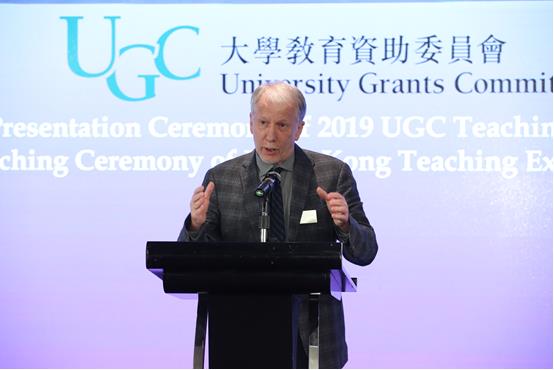Acceptance Speech by Professor Gray M Kochhar-Lindgren of the Common Core@HKU: Transdisciplinarity-in-Action Team at the Presentation Ceremony of the 2019 UGC Teaching Award (10.10.2019)

Transdisciplinarity-in-Action necessarily occurs in collaboration with a host of others and our team—Xiao Hu (Education), Gina Marchetti (Comparative Film Studies), Matthew Pryor (Landscape Architecture), Julian Tanner (Biomedical Sciences), and myself—wants to extend our heartfelt thanks to far more people than we can mention here. Let me first thank the UGC for its leadership and the Selection Panel for their dedication. We are extremely grateful to the senior leadership of the University of Hong Kong, including President Xiang Zhang, Provost Richard Wong, and VP & PVC(T&L) Professor Ian Holliday, who leads the teaching and learning efforts across the campus with great flair, commitment, and intelligence. We want to thank his predecessor, Professor Amy Tsui, the visionary leader who brought the Core into existence, Professor Joseph Chan, a guiding spirit of the Core, and Gwyn Edwards, the inaugural Director. We work with the Common Core's extraordinary staff and with extraordinary colleagues across all ten faculties at HKU. We want to extend a special thanks to all of our families for putting up with us, but, most of all, we want to thank the HKU students with whom we have worked so closely and who have taught us so much.
In order to foster a learning culture of engagement, experimentation, and enjoyment, the team has created a network of platforms that we call Transdisciplinarity-in-Action. Trans- is a prefix that indicates not only movements across more-or-less preestablished domains of knowledge called academic "disciplines," but also, and equally as importantly, a movement between the university and its multiple partners. Members of our team have created a flipped classroom, a MOOC, a database of student videos, and an exploration of how to invent and distribute an inexpensive diagnostic instrument for Hepatitis-C. Across Hong Kong we have created Teaching by Design—a collaboration between libraries, secondary schools, local organizations, and universities—and Responsive4U, a program through which we share courses with other universities while they share their courses with our students. And, on the global scale, we have facilitated a Transdisciplinary Research Exchange, we were one of the partners for the Wellcome Trust's Contagious Cities Project, and we have established a consortium called GLADE: Global Liberal Arts Design Experiments.
A set of principles binds these examples into a structured, but flexible, system of teaching and learning. The first principle is simply the continuing exploration of the action of the trans-, with its shifting configurations of disciplines, epistemologies, methodologies, and collaborations. The second is the need to pay close attention to the many administrative tasks that creatively initiate and support new platforms in teaching and learning. The third principle is that we all seek to create a culture of curiosity that links deeply with the desires of both students and colleagues. And the final principle that binds Transdisciplinarity-in-Action into a formative series that makes a difference for all of us—and for those who will follow—is the ongoing need for institutionalizing the pzazz of the inspired pragmatism that is our understanding of education.
Partnering with students from all eight UGC-supported universities, we will facilitate transdisciplinary projects on the three UN SDGs of Good-Health and Well-Being (#3), Gender Equality (#5), and Sustainable Cities and Communities (#11). Once a year, we will have a gathering of all the participants to workshop and reflect together. During the year, smaller student teams will be engaged in research around their chosen SDG. The projects will be implemented using transdisciplinary research methods and produce innovative outcomes such as videos, start-ups, performances, community health interventions, digital stories, or policy recommendations. The entire three-year project will conclude with a Transdisciplinarity-in-Action Public Festival.
Transdisciplinary learning, then, occurs in a dialogical scenario in which a change of state occurs that is expansively illuminating, is felt like a humming vibration is felt, and invites reflection, articulation, sharing, and reiteration. The learning that activates the trans- reverberates along unpredictable pathways. In conclusion, we want to thank Hong Kong itself, which we all deeply love, and as educators want to do what we can to help establish a flourishing future for the city. And, finally, thank you all so much for your attention, for the generosity of the award, and, most of all, for the work that each of you is doing to create learning networks that will continue to resonate.Transdisciplinary learning, then, occurs in a dialogical scenario in which a change of state occurs that is expansively illuminating, is felt like a humming vibration is felt, and invites reflection, articulation, sharing, and reiteration. The learning that activates the trans- reverberates along unpredictable pathways. In conclusion, we want to thank Hong Kong itself, which we all deeply love, and as educators want to do what we can to help establish a flourishing future for the city. And, finally, thank you all so much for your attention, for the generosity of the award, and, most of all, for the work that each of you is doing to create learning networks that will continue to resonate.